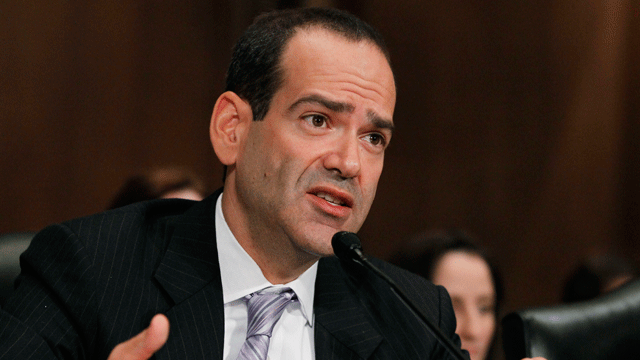
Neil Barofsky, special inspector general for TARP, testifies before the Senate Finance Committee hearing to examine the Troubled Asset Relief Program (TARP) on Capitol Hill in Washington, Wednesday, July 21, 2010. (AP)
Government watchdogs on Wednesday raised a red flag over the Obama administration's program for helping homeowners avoid foreclosure, saying the multibillion-dollar fund is not working and the Treasury Department refuses to fix it.
Warning that the inefficiencies could hold the economy back, the officials told a Senate panel that changes should be made and that Treasury needs to come clean. One official called the program "one of the greatest failures in transparency and accountability" in the $700 billion bailout.
A $50 billion fund was carved out of the Wall Street bailout for the mortgage program. The housing market being a root cause of the 2008 economic crisis, the money was pitched as a way to help millions of homeowners avoid foreclosure and get the economy back on track.
But a fraction of that money, $248 million, has been spent.
Elizabeth Warren, chairwoman of the congressional TARP Oversight Panel, said that for every one family that wins a permanent mortgage modification, "10 more have been moved out through foreclosure."
"This is a program that's just -- it's behind the curve," she told the panel on Wednesday.
Special inspector general for the financial bailouts Neil Barofsky said the program has not "put an appreciable dent in foreclosure filings" during the Senate Finance Committee hearing on the $700 billion bank bailout. He also said the Treasury Department has ignored earlier demands that it set clearer goals for the program.
A Treasury official said Wednesday that the bailout program has had "a major effect on the ability of people to stay in their homes." The official argued that before the program was launched, it was not designed to prevent all foreclosures and not designed to help investors or speculators -- or those with vacation homes or million-dollar homes.
More foreclosures could force down home prices and further hurt the ailing housing industry.
Part of the problem with the Home Affordable Modification Program has been that plenty of homeowners are being accepted into a trial period, but relatively few are having their loan changes made permanent. Warren said just 165,000 have moved into permanent modifications with help from the TARP program, though more than that have advanced through a similar program administered by Fannie Mae and Freddie Mac.
Barofsky said Treasury is giving mortgage companies too much leeway to decide which homeowners will qualify for a program to reduce the principal balance of their mortgages.
The program relies on voluntary cooperation from mortgage companies, Warren said. She said many of the mortgage debt collectors make more money when they foreclose than they do when helping homeowners.
"We can't have a program in which, in effect, we put incentives on the table paid for by the taxpayers to say, 'Please do the right thing here,'" she said. "We have a crisis, and the consequences of not having cooperation from the servicers ... (is) felt by this entire economy. We need a program with far more urgency and some real teeth in it."
The Associated Press contributed to this report.




